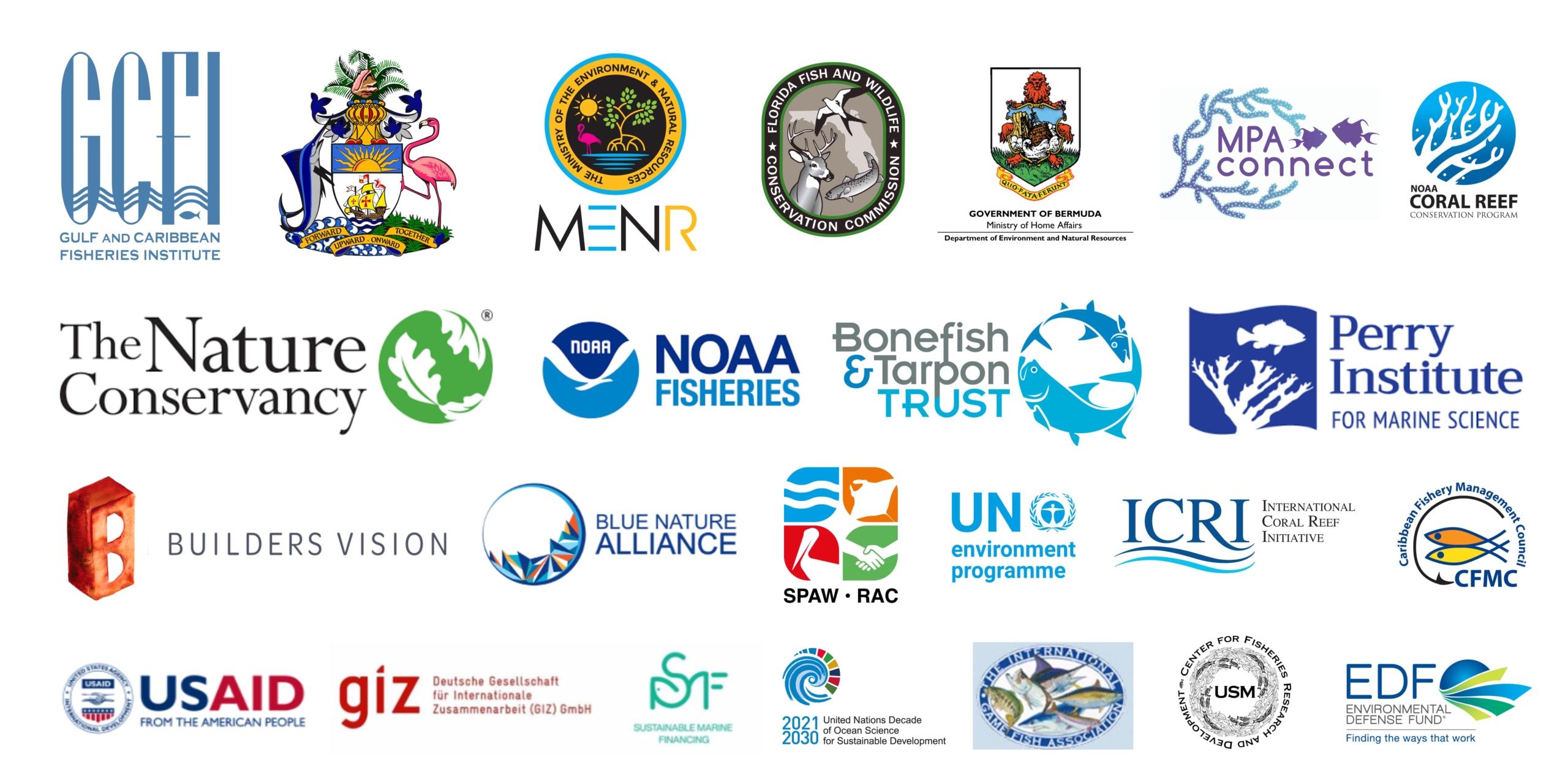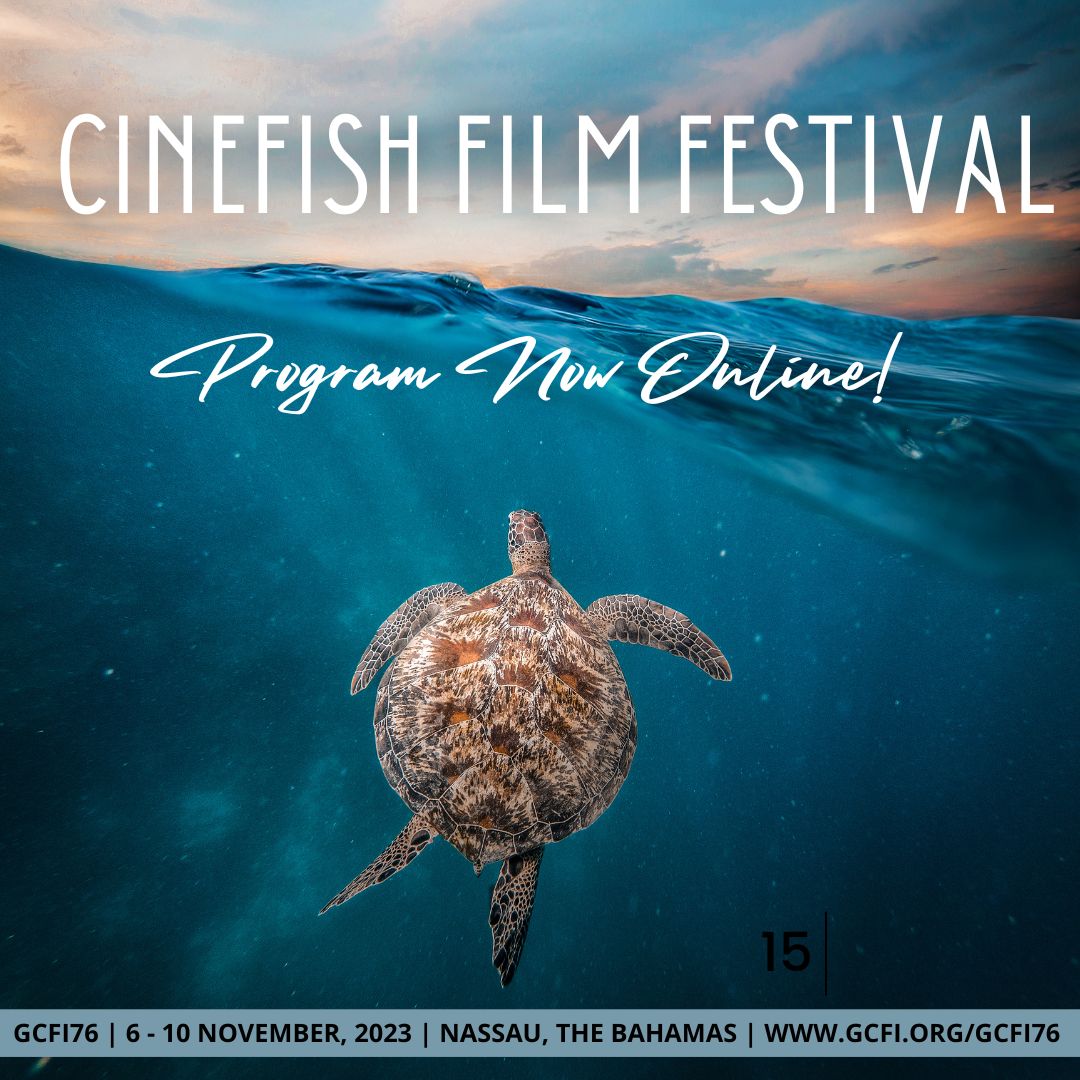Quick Links
GCFI76 – Nassau, New Providence, The Bahamas
Important Dates
- Abstract Submission: Extended to July 1, 2023. Click here to submit
- Student Awards: Extended to July 1, 2023. Click here for more information
- Gladding Memorial Award: August 15, 2023: Click here for more information
- CINEFISH: August 15, 2023: Click here to submit
- Early Bird Registration: September 30, 2023: Click here to register
KEYNOTE SPEAKER
The Feature Keynote Address of the 76th Annual Gulf and Caribbean Fisheries Institute (GCFI76) will be delivered by Dr Ana Spalding on “A global tropics perspective on making ocean science and governance more equitable and effective”. Dr. Spalding is the Founding Director of the Adrienne Arsht Community-Based Resilience Solutions Initiative and Staff Scientist at the Smithsonian Tropical Research Institute (STRI); and affiliated as Associate Professor at Oregon State University.
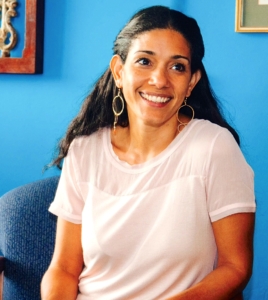 Dr. Spalding has an applied interdisciplinary social science background in economics, marine affairs and policy, and environmental studies; and approximately 20 years of applied experience in international development, conservation, and environmental consulting in Panama and the US. Broadly, her research group studies drivers of global change, impacts of that change on the most vulnerable communities, and what we as a society can do to better respond to those changes and impacts. At STRI, she is advancing interdisciplinary approaches to resilience science and community-based solutions to pressing environmental problems through research, training, and engagement. At OSU she offered several US Ocean Policy courses and guest lectures, and supervised graduate student research related to ocean uses and management across a variety of themes such as marine protected areas (MPAs), offshore renewable energy, fisheries and aquaculture, and adaptation to climate change. Her current research includes locally led conservation, adaptation as a pathway to resilience for marine resource-dependent communities in California and Oregon, and the role of ocean governance tools (e.g., Marine Protected Areas) in achieving just and equitable goals for people and nature. Dr. Spalding is committed to interdisciplinarity and collaboration as a critical framework for co-creating innovative and just solutions to coupled social-environmental crises facing our oceans.
Dr. Spalding has an applied interdisciplinary social science background in economics, marine affairs and policy, and environmental studies; and approximately 20 years of applied experience in international development, conservation, and environmental consulting in Panama and the US. Broadly, her research group studies drivers of global change, impacts of that change on the most vulnerable communities, and what we as a society can do to better respond to those changes and impacts. At STRI, she is advancing interdisciplinary approaches to resilience science and community-based solutions to pressing environmental problems through research, training, and engagement. At OSU she offered several US Ocean Policy courses and guest lectures, and supervised graduate student research related to ocean uses and management across a variety of themes such as marine protected areas (MPAs), offshore renewable energy, fisheries and aquaculture, and adaptation to climate change. Her current research includes locally led conservation, adaptation as a pathway to resilience for marine resource-dependent communities in California and Oregon, and the role of ocean governance tools (e.g., Marine Protected Areas) in achieving just and equitable goals for people and nature. Dr. Spalding is committed to interdisciplinarity and collaboration as a critical framework for co-creating innovative and just solutions to coupled social-environmental crises facing our oceans.
Abstract: Globally, the tropics are home to most of the world’s biodiversity and to most of the people whose cultures and livelihoods are closely tied to and depend on healthy marine environments. We call this majority of directly ocean-dependent people the ‘tropical majority’. Despite the important local ocean-specific science, perspectives, and knowledge held by the tropical majority; most funding, governance, and education institutions are in high-income nations outside of the tropics. Unfortunately, this undermines the equity and effectiveness of current solutions to pressing marine environmental challenges and hinders leadership opportunities by the tropical majority. To counter this imbalance and achieve more equitable and effective ocean futures for people and nature, during my talk I will propose and discuss four tangible actions that can influence a vision for more sustainable fisheries: 1. Center equity in ocean governance, 2. Reconnect people and the ocean, 3. Redefine ocean literacy, and 4. Decolonize ocean science (inclusive of social and natural sciences).
Venue
The venue for GCFI76 will be the Atlantis Paradise Island Hotel.
Please make your reservation using this link: https://book.passkey.com/e/50582575
The cut-off date for making reservations will be Thursday, October 5, 2023. Reservation requests received after the Cut-
Off Date will be accepted by the Resort on an availability basis only. If the Group Rate is unavailable after the Cut-Off
Date, the prevailing public rates will apply for any reservations confirmed after the Cut-Off Date.
There are two room options available for GCFI76. Please view the website for more information about these options.
- The Coral : $195.00 US + taxes per night
- The Royal. $279.00 US + taxes per night
The room rates at the Coral and Royal include resort fees but do not include taxes.
The rates are quoted based on single or double occupancy. A maximum of four persons are allowed within a single guest room. Additional occupants 12 years old and over (i.e. the 3rd or 4th guest) will be charged at a rate of $50.00 per person, per night, plus applicable Tax and Resort Charges
The rates listed above include
- Wi-Fi in guest rooms and lobby areas for up to 4 devices
- Access to the 141-acre Aquaventure Water Park
- Access to the Fitness Center: Up to 2 persons per day per room
- Two Keepsake Reusable Water Bottles per room
- Unlimited local phone calls
- Access to the Atlantis Movie Theater
- Resort Shuttle Service
- In-Room Coffee and Tea
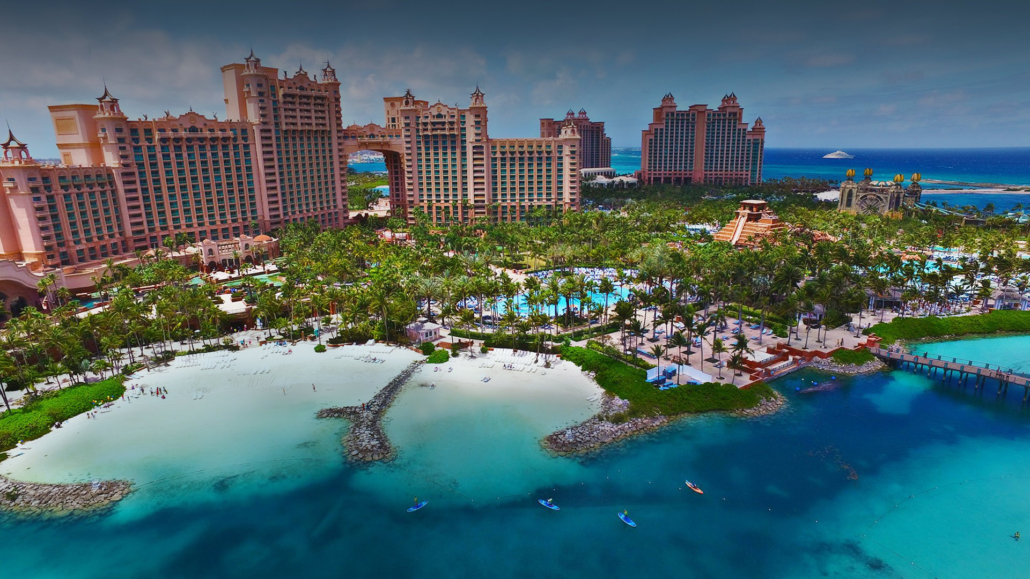
About the Conference

GCFI is pleased to announce that the 76th annual meeting of the Gulf and Caribbean Fisheries Institute (GCFI 76) will be held in Nassau, New Providence, The Bahamas from 6 – 10 November 2023 at Atlantis Paradise Island Bahamas.
GCFI is partnering with the Ministry of the Environment and Natural Resources of the Bahamas to host GCFI76.
GCFI76 is an Endorsed Decade Action Program with the United Nations Decade of Ocean Science for Sustainable Development
Conference Theme
The theme of this year’s conference is “Linking science and society towards a vision for sustainable fisheries“.
Join us in Nassau, Bahamas, this November to exchange ideas and perspectives on emerging research and science with direct relevance to management and governance. The theme of this meeting highlights the importance of engagement and dialogue among diverse sectors to ensure a sustainable future of the region’s fisheries and marine resources. The marine environment continues to be threatened by impacts from overfishing, habitat loss and climate change, resulting in decreased biodiversity, increasing social inequality, and increasing food insecurity. These impacts present significant challenges now and into the future. During the meeting, we will discuss key topics for engaging in, and supporting, innovative approaches including ocean literacy, strengthening governance mechanisms, and developing inter- and transdisciplinary research.
As we look forward to a future of sustainable fisheries, it is necessary to examine options, paths, and barriers. Considering this, we are preparing a program comprised of an opening plenary, general sessions, workshops, and technical sessions related to sustainability, fish and aquatic ecosystems, fisheries and society, and innovations in fisheries. We will bring together experts, academics, policymakers, managers, fishers, and relevant organizations interested in marine issues, natural resources, sustainable fisheries, and tourism.
In keeping with the theme of the conference, submissions for oral and/or poster presentations on the following topics are encouraged:
- Innovative strategies that promote management and fishery conservation.
- Potential short-term and long-term impacts of climate change on fisheries and aquaculture sustainability including integrating knowledge on climate change into fisheries management and marine spatial plans (e.g., modelling and mapping tools, risk and vulnerability analyses, sea-use scenarios; ocean planning and management initiatives)
- Innovative strategies that support fishers and communities as they work to meet the sustainable fisheries goals.
- Social justice, equity, and fairness in marine fisheries and how these can be integrated into national and international fisheries management and science,
- Promoting research and training to build capacity and improve sustainability of local and regional fisheries.
- Integrating approaches to restore key species, communities, ecosystems, and ecological processes
- Aquaculture approaches to address food insecurity and depleted stocks
Registration
GCFI76 registration includes access to our conference app (Whova) all technical sessions, workshops, the Fisheries for Fishers forum, special thematic sessions, the poster session, the CINEFISH film festival, field trips, socials and other special events. Registration can be completed online at: https://www.gcfi.org/conference-registration/
The registration rates are as follows:
| GCFI Members | In Person
Rate (USD) |
Virtual Rate
(USD) |
| Regular Early-Bird (through 30 September) | 200 | 125 |
| Regular | 250 | 150 |
| Regular Onsite | 300 | N/A |
| Student Early-Bird (through 30 September) | 75 | 25 |
| Student | 95 | 50 |
| Student Onsite | 125 | N/A |
| Non-Members | In Person
Rate (USD) |
Virtual Rate
(USD) |
| Regular Early-Bird (through 30 September) | 300 | 200 |
| Regular | 350 | 250 |
| Regular Onsite | 400 | N/A |
| Student Early-Bird (through 30 September) | 125 | 75 |
| Student | 145 | 100 |
| Student Onsite | 175 | N/A |
GCFI acknowledges that some of our members may not be able to afford virtual registration rates due to hardships experienced as a result of COVID-19. Please email [email protected] to submit a request for waiver of virtual registration fees.
Call for Abstracts
The deadline for abstract submission for GCFI76 has been extended to July 1, 2023. Abstracts will be accepted in English, French, and Spanish. Abstracts are only required in one of the three languages; titles must be in all three languages. Abstracts must not exceed 250 words (275 for Spanish and French). Abstracts must be submitted online via the secure online Abstract Submission Form.
Acceptance to present within an oral or poster session requires submission of an extended abstract. Extended abstract preparation guidelines are available online. Members of GCFI are encouraged to submit full manuscripts or short communications based on presentations given at GCFI meetings to Gulf and Caribbean Research for peer review. Accepted manuscripts will be published open access at no charge to the authors through the GCFI-GCR partnership. Full manuscripts will also be accepted for publishing in the GCFI Proceedings.
Authors of accepted presentations will be notified via e-mail. Submissions intended for the oral presentation, but not granted a slot, would automatically be accepted as a poster presentation. Regardless of the format, we encourage everyone who is interested in participating to submit an abstract.
Abstracts for GCFI76 are due by July 1, 2023.
Technical Sessions
The conference program features multi-disciplinary thematic sessions that have a mix of natural and social science, management, and technology related to the ecosystem or fisheries. Abstracts are solicited in the following areas (other subjects not listed will also be considered):
- Coastal and estuarine connectivity
- Governance, livelihoods, and organizations
- Reefs and associated ecosystems and fisheries
- Shallow and deep reef fishes
- Snapper and grouper fisheries
- Fish spawning aggregations
- Lionfish and other invasive species
- Artificial Reefs
- Marine protected areas science and management
- Pelagic ecosystem and recreational fisheries
- Continental shelf ecosystem fisheries
- Shrimp and demersal trawl fisheries
- Habitats and coastal management
- Climate change science and adaptation
- Sargassum science and management
- Aquaculture
- Communication and environmental education
- Marine litter science and management
- Queen conch, spiny lobster, oysters and other invertebrates
- Vision of the UN Ocean Decade
Special Sessions
1.Research and stakeholder collaboration to inform and execute conservation and restoration
Organizers: Bonefish & Tarpon Trust
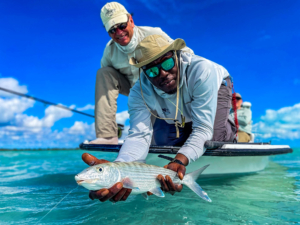 Session Description: Fisheries and habitat conservation in the modern world are faced with many challenges, including habitat loss/degradation, water quality declines, climate change impacts, and fishery capacity issues. These challenges are especially acute in nearshore areas, where anthropogenic impacts are most intense. Addressing these challenges requires a multidisciplined, collaborative effort from scientists, stakeholders, resource managers, and others on research, education, advocacy, and application of actionable knowledge to address conservation needs. Stakeholder engagement and collaboration in research is essential to conserve and restore ecosystems, associated biodiversity, and the fisheries that depend upon healthy ecosystems. Outdoor recreation specialists, such as commercial/artisanal fishermen, guides, and anglers, represent a stakeholder group that have unique incentives to contribute to conservation and stewardship. This session invites presentations and posters that highlight collaborative projects that address conservation challenges, and share successes, failures, and lessons learned. Areas of focus include fish habitat use, habitat conservation, habitat restoration, protected areas, education, user conflicts, collaborative fishery assessments, water quality.
Session Description: Fisheries and habitat conservation in the modern world are faced with many challenges, including habitat loss/degradation, water quality declines, climate change impacts, and fishery capacity issues. These challenges are especially acute in nearshore areas, where anthropogenic impacts are most intense. Addressing these challenges requires a multidisciplined, collaborative effort from scientists, stakeholders, resource managers, and others on research, education, advocacy, and application of actionable knowledge to address conservation needs. Stakeholder engagement and collaboration in research is essential to conserve and restore ecosystems, associated biodiversity, and the fisheries that depend upon healthy ecosystems. Outdoor recreation specialists, such as commercial/artisanal fishermen, guides, and anglers, represent a stakeholder group that have unique incentives to contribute to conservation and stewardship. This session invites presentations and posters that highlight collaborative projects that address conservation challenges, and share successes, failures, and lessons learned. Areas of focus include fish habitat use, habitat conservation, habitat restoration, protected areas, education, user conflicts, collaborative fishery assessments, water quality.
Contact: For information please contact Aaron Adams ([email protected])
2. MPA networks as tools to implement ecosystems monitoring programs
Organizers: Regional Activity Centre for the Protocol Concerning Specially Protected Areas and Wildlife for the Wider Caribbean Region – SPAW RAC and the Gulf and Caribbean Fisheries Institute.
Context: Monitoring is critical to know what is occurring on the ground and give regular, robust and strategic reporting to influence coastal management decision-making at regional, national and local levels. Such reports on the status of ecosystems can provide more reliable and accurate data and information to inform national /regional level policy, decision-making and reporting, and support the reporting by countries on their achievement of global objectives and targets e.g. Convention on Biodiversity, Global Biodiversity Framework, Ramsar Convention, Sustainable Development Goals, etc.). Monitoring programs also help to understand broader environmental trends and identify emerging issues impacting marine ecosystems.
At national, sub regional or regional scale, marine protected areas (MPA) manager networks build capacity and improve the effectiveness and sustainability of MPAs through sharing of experiences, best practices, knowledge and technical and scientific information. They allow for exchanges between managers and stakeholders with common issues in different local contexts and facilitate creative solutions, problem solving and resource sharing.
Given the existence of various national and regional monitoring programs and the role of regional marine protected areas networks in supporting such monitoring, this proposed GFCI special session represents an opportunity to identify opportunities for further collaboration and action.
Goal: To discuss and exchange ideas on how MPA managers networks can be used as a mechanism to develop, enhance and/or implement comprehensive ecosystems monitoring programs in the Wider Caribbean Region.
Proposed agenda:
1. Tropical Ecosystems Monitoring Programs in the Caribbean – 1h30
The first part of the session will cover existing monitoring networks in the Caribbean with regard to the tropical ecosystems including coral reefs, mangroves and seagrass beds. Technical presentations will be made to showcase the existing initiatives in the region, their objectives, work done, actors involved, capacity-building, tools available and main results in terms of ecological trends of these ecosystems in the Caribbean. A strong focus will be made on the GCRMN-Caribbean network which ensures the collection of useful, comparable and accessible data that can effectively reveal the status and trends of the coral reefs in the region. This session will help contribute to efforts by the Cartagena Convention Secretariat to develop its second State of Marine Habitats Report and to report on various regional and global objectives and targets.
2. Caribbean MPA Networks working on monitoring practices – 1h30
The second sub-session will focus on existing marine protected areas networks in the wider Caribbean region, including the SPAW-listed protected areas network, MPA Connect, DCNA Network, Red Golfo, etc. Presentations will cover existing links and synergies between these networks of MPA with regards to ecosystem and biodiversity monitoring programmes, evaluation, contribution to conservation, knowledge sharing, etc. MPA Networks can be force multipliers to increase knowledge on the state of marine ecosystems. Information collected in MPAs are crucial in order to provide relevant indications on ecological trends inside and outside protected zones.
3. Opportunities of collaboration between MPA Networks, and regional monitoring programs – 1h00
The third part of the session will be dedicated to explore opportunities for collaboration between the MPA networks and regional monitoring programmes, identification of needs and ways to bridge the gaps.
Target Audience: Regional MPA managers, scientists, NGOs, government officials/decision-makers and regional/international organizations.
Contact: For information please contact Geraldine Conruyt: [email protected]
Workshops
1) Developing Harvest Strategies Using FishPath & Using Adaptive Implementable Management to Achieve Human & Ecological Welfare Objectives
Sunday 5 November, 2023 | 8 am – 5 pm | Pre- Registration required
Organizers: National Oceanic and Atmospheric Administration (NOAA), The Nature Conservancy, and Gulf Caribbean Fisheries Institute
Conveners: Josh Nowlis (NOAA Fisheries) and Jason Cope (NOAA Fisheries) and Williams Michaels
Scope of workshop: Fisheries managers often feel that inadequate data prevent them from actively managing their fisheries. This perception can manifest itself in lack of clarity to move forward, feelings of hopelessness and management paralysis. Although many data-limited methods exist, they were previously scattered through the literature and not clearly linked to data collection schemes and management measures. FishPath is a decision-support tool developed by The Nature Conservancy, NOAA Fisheries, and CSIRO Australia to guide managers through the full range of data-limited options for fisheries management. It helps identify fisheries-specific options for effective data collection, assessment models and indicators, and systems of management response to stock status. FishPath provides an objective and transparent tool to develop robust harvest strategies regardless of data and management impediments in order to make the most of available data and other resources. It also provides pathways for adaptive management and strategic thinking. The GCFI workshop will provide an overview of this powerful new tool, including hands-on exercises so that participants can explore the potential to improve their sustainable fisheries management practices. Theme topics will include:
- Overview of the Management System
- Data collection
- Assessment methods
- Management methods
- FishPath Questionnaire
- Walk through specific example while encouraging attendees to follow along and answering questions with respect to their own fisheries.
- Review results from our example
- Review results from participants
- Demonstrate how to identify the most relevant options
- Highlight some common issues and opportunities:
- Size-based assessment methods
- Harvest control rules and addressing uncertainty
- Compliance and enforcement
Registration: Workshop registration and invitation will be limited to 40 participants, and must be completed via this link
Contacts: For more information please contact Josh.Nowlis ([email protected]) or Jason Cope ([email protected])
2) Interactions between human activities and marine megafauna of the Caribbean: progress made through the CAMAC project and potential for future actions
Saturday 4 November, 2023 | 8 am – 5 pm | Pre- Registration required
Organizers: The Agoa Sanctuary and the SPAW-RAC
Conveners: Magali Combes, Claire Pusineri, Lucas Genève, Célie Nazical, Amandine Escarguel, Géraldine Conruyt
Context: The habitats of most species of marine megafauna (sharks, sea turtles, marine mammals and seabirds) strongly overlap with human activities such as fishing, shipping and tourism. These frequent interactions can lead to negative impacts on these vulnerable species, as well as socio-economic issues for the human coastal communities. In the Caribbean, these impacts remain poorly quantified and mitigated.
The regional cooperation project CAMAC, for CAribbean marine Megafauna and anthropogenic ACtivities, aims to improve knowledge and strengthen regional collaboration and stakeholder capacities around these issues. CAMAC will ultimately provide Caribbean governing bodies and environmental stakeholders with recommendations and tools to reduce the negative impacts resulting from the interactions between marine megafauna and human activities.
The CAMAC project will address these objectives through four thematic work packages:
(1) Interactions with fisheries: assessment of socio-economic and environmental issues in collaboration with Caribbean fisheries organizations;
(2) Stranding networks: harmonization of protocols and capacity building;
(3) Awareness raising: strengthening of environmental education skills and creation of a school twinning program;
(4) Knowledge enhancement: development of a scientific framework for regional megafauna assessment and enrichment of knowledge of poorly known areas or species through surveys.
The project is planned for 5 years (2023-2028) and is structured in 2 phases:
- Phase 1 has already started and will end in December 2023. It focuses on the review of available information and data, on the development of partnership with regional stakeholders and on the determination of the protocols and needs for phase 2.
Phase 2 is expected to be confirmed in 2023 and should take place from 2024 to 2028. It will be dedicated to the implementation of the protocols determined during phase 1, in collaborations with identified partners.
Objective: This workshop aims to bring together the CAMAC partners and other Caribbean stakeholders working on fisheries, megafauna conservation, and environmental education, to discuss and validate the major outputs of CAMAC phase 1. These outputs (review of available information, partnership building and identification of protocols and needs for phase 2) will first be presented and the attendees will then split into 4 thematic round tables to discuss and validate the protocols for phase 2.
Provisional workshop program
8:30am – Welcome Coffee
9:00am – 10:00am – Presentation session.
Presentation of the CAMAC project and the outputs of phase one (2023), including:
- Synthesis of available data on fishing effort and interaction with marine megafauna.
- Stranding network trainings report
- Workplan for phase 2 regarding Marine mammal and sea turtle stranding networks enforcement.
- Hub of Caribbean educational tools on marine megafauna.
- Regional protocols for megafauna knowledge enhancement during phase 2.
10:00am – 10:30am – coffee break.
10:30am – 12:00pm – Round table workshops I (4 round tables organized simultaneously out of the following themes)
- Fisheries interactions: discuss workplan, protocols and partnership for phase II (knowledge enhancement), taking into account the results of phase one and related regional projects (e. French AP, Leatherback AP, REBYCIII).
- Regional-based scientific knowledge protocols for marine mammals: discuss and validate the regional protocols developed with partners during CAMAC phase 1
- Regional-based scientific knowledge protocols for sharks: discuss and validate the workplan developed with partners during CAMAC phase 1.
- Marine mammal and sea turtle stranding networks: discuss workplan for phase II
12:00pm – 2:00pm lunch break
2:00pm – 3:30pm – Round table workshops II
The same thematic round tables as in the morning will be organized, so that workshop attendees will be able to attend a second round tables on the topics of their choice.
3:30pm – 4:00pm Coffee Break
4:00pm – 5:00pm presentation of workshop major outputs and discussion
5:00pm – 5:30pm – Closing session.
Registration Deadline: Registration should be completed via this link before September 30, 2023.
Contact: For more information please contact Magali Combes, CAMAC project manager ([email protected])
Student Awards
Outstanding Student Achievement Award
GCFI is awarding $1,500 scholarships to the best oral and poster presentations (both virtual and in-person presentations are eligible). The content of the presentation must be related to final research done by the student related to their thesis or dissertation. If already submitted, this thesis or dissertation must be no older than one year. A manuscript of the oral/poster presentation must be submitted to be eligible for this award. The award winners will receive their scholarship at the following year’s conference, to help support their participation in this meeting. Complete instructions and eligibility requirements are on the Outstanding Student Achievement Awards web page.
GCFI Travel Awards
GCFI will offer two travel awards of US$750 each to eligible students to help offset travel costs to GCFI76. The deadline for students to apply for this award has been extended to July 1, 2023. Complete instructions and eligibility requirements are on the GCFI Student Travel Awards web page. Students may apply for a travel award and for consideration for the Student Achievement Award in the same year. Students who received the GCFI75 Student Achievement Award are not eligible for a travel award.
Ron Schmied Scholarship
The Ron Schmied Scholarship, a GCFI initiative supported by the International Game Fish Association (IGFA) and private individuals, will be offered to a qualified graduate student in support of their travel to GCFI76. The Scholarship is in the amount of US$1,500, and graduate students with an interest in social, economic, biological, ecological, or management perspectives on recreational fisheries are eligible to apply. The deadline for students to apply for this award has been extended to July 1, 2023. Note that a manuscript of the oral/poster presentation must be submitted to be eligible for this award. Complete instructions and eligibility requirements for the Ron Schmied Scholarship are on the Ron Schmied Scholarship page. Students may apply for the Scholarship and for consideration for the Student Achievement Award in the same year. Students may also ask to be considered for the Ron Schmied Scholarship and a GCFI Travel Award in the same year but will only receive one award.
SCRFA Travel Award
The Science and Conservation of Fish Aggregations Association (SCRFA) will offer a Student Travel Award of US$800 to a student in the Caribbean Region to attend GCFI 76, Nassau, Bahamas. Originally formed in 2000 and known as the Society for the Conservation of Reef Fish Aggregations with the mission of promoting responsible stewardship of fish aggregations, in particular, reef fish spawning aggregations, the Society modified its name in 2012 to reflect its focus on science and the inclusion of all aggregating fish species. The SCRFA Student Travel Award is to encourage and help students to work in this important area and showcase their ideas and work at GCFI.
The deadline for students to apply for this award has been extended to July 1, 2023 at which time abstracts and all supporting paperwork must be submitted. Complete instructions and eligibility requirements for the SCRFA Award are available on the SCRFA Award page. Applications and further information enquiries are to be sent to Martin Russell (SCRFA Chair/CEO) or, visit: www.SCRFA.org.
Gladding Memorial Award
As a component of the Fisheries for Fishers (F4F) Initiative, the GCFI Gladding Memorial Award (GMA) committee is requesting nominations of outstanding fishers for GCFI76. This annual award is presented to select fishers (male or females) who demonstrate, as Peter Gladding did, significant commitment to the sustainable use and long-term conservation of marine resources in the Gulf and Caribbean region. 2024 will represent the 20th year anniversary of the first award. The winner will be sponsored to attend GCFI76 in Nassau, The Bahamas to receive his or her award, and to participate in the entire conference including the Fisheries for Fishers Forum and Fishers field trip.
Nominations can be submitted via an electronic form or if more convenient, a word document version can be downloaded here, filled in and emailed to [email protected]. All nominations must be received by 15 August 2023 and nominators are welcome to request further information and guidance.
Please be prepared to supply the following information:
- List and describe the nominee’s experience in the fisheries sector (commercial, recreational, charter, subsistence, or other). This can include any involvement along the fisheries value chain, including but not limited to harvesting, processing, distribution, and marketing. This can take the form of a bulleted list with dates and locations of activities.
- Describe the nominee’s work in the promotion of conservation and sustainable use of marine fisheries resources. This can include work in habitat protection, marine protected areas, promoting sustainable practices, supporting sustainable practices in the value chain, etc. (bullet points of major contributions, supported by narrative on the following pages).
- Describe the impact of the nominee’s life and work in relation to the fishing community and fisheries resources focusing on leadership and being perceived as a role model (bullet points supported by narrative).
Submissions can also be in the form of a short video (5 mins max) addressing the 3 questions above and submitted to [email protected]
Background information on the GMA is available on the Gladding Memorial Award webpage.
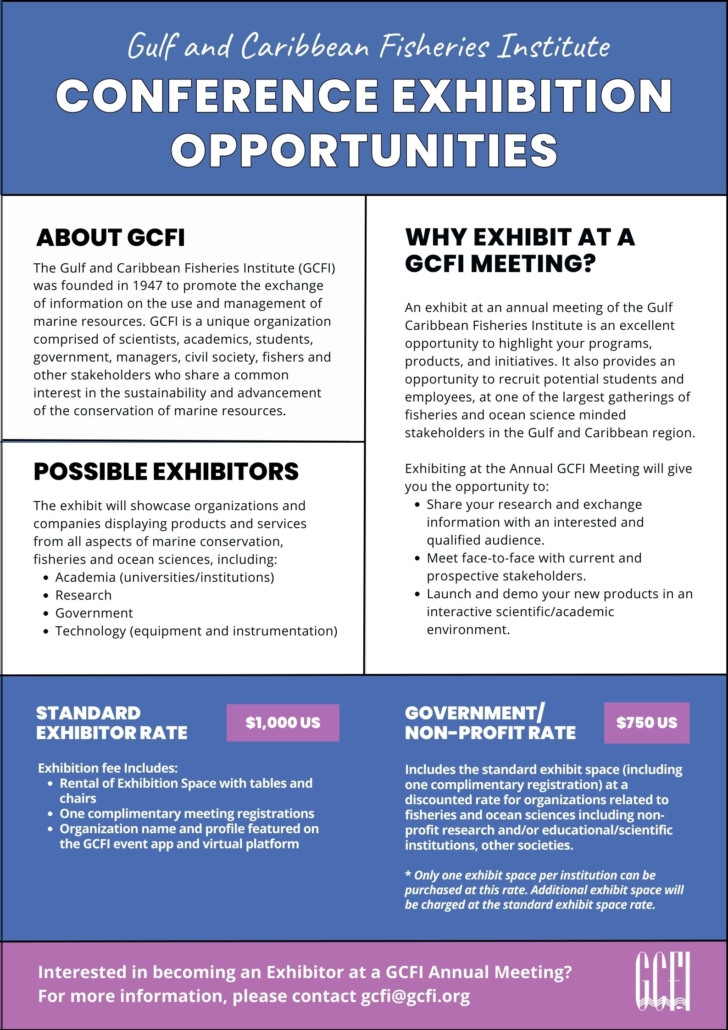
Loading…
Partners and Sponsors
